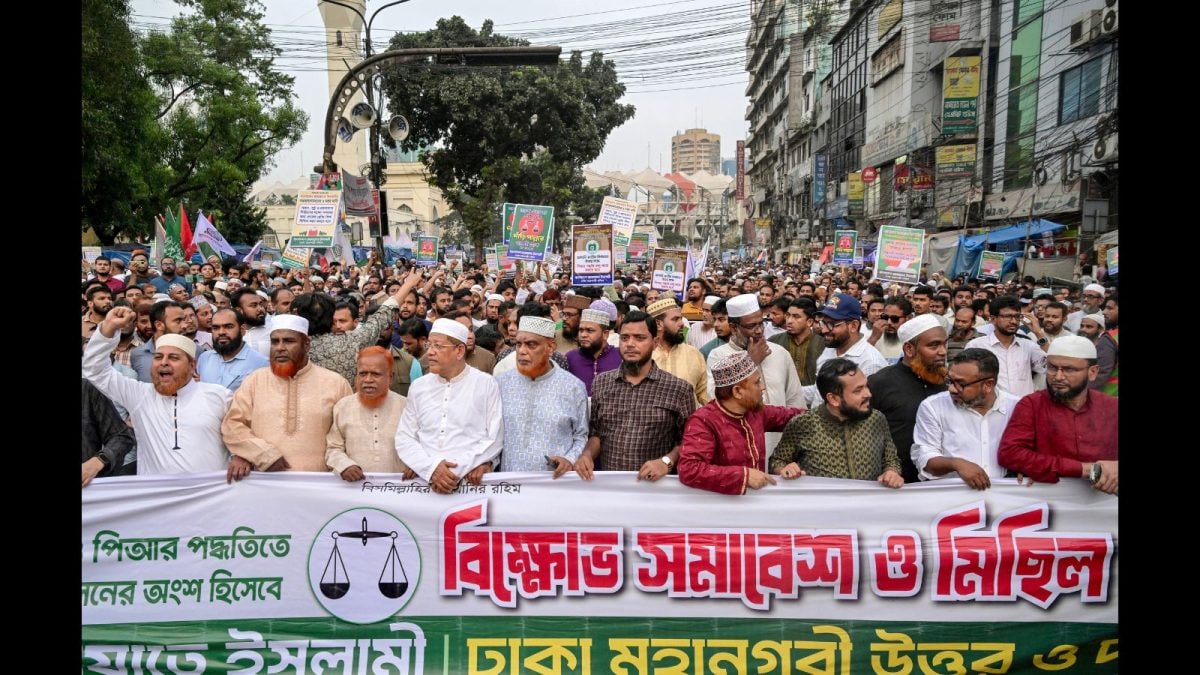Last Updated:
Indian intelligence agencies are closely monitoring the Bengal, Assam, and Tripura corridors, fearing the revival of radical sleeper cells and cross-border ideological spill-over

The re-entry of Jamaat into formal politics also threatens the fragile opposition unity in Bangladesh. (AFP)
Jamaat-e-Islami is preparing an aggressive return to Bangladesh’s political mainstream with nearly 300 candidates lined up for the upcoming national elections in a move that has triggered serious ideological and security concerns in India, particularly along its eastern border states.
According to an Intelligence Assessment Note accessed by CNN-News18, Jamaat, under the leadership of Ameer Shafiqur Rahman, has finalised 298 candidates, marking the largest mobilisation since the organisation was officially banned in 2013. The resurgence is being positioned as a transformation from a proscribed Islamist movement to a populist, nationalist-Islamist political force wrapped in democratic rhetoric.
Recommended Stories
The group’s revival is being driven through a deep grassroots network of district-level shura committees, student wing Islami Chhatra Shibir, and aggressive digital outreach, including online campaigns focused on Palestine solidarity, anti-corruption, and justice for past movement victims. The October 2 rally in Dhaka, attended by nearly 4,00,000 supporters, signaled Jamaat’s ambition to position itself as a moral alternative to both the Awami League and the BNP.
While Jamaat has publicly dropped visible Islamist symbols, reportedly under pressure from Western envoys, the core ideological framework remains intact. Party insiders like Maulana Rafiqul Islam Khan and Mia Ghulam Parwar are driving a “digital jihad” narrative, leveraging social media to re-engage disillusioned youth and revive dormant ideological cells.
Jamaat’s diplomatic engagements with Turkey, Qatar, Malaysia, and UK-based Islamist networks have added a new layer of geopolitical concern. Intelligence sources suggest these external actors are offering soft power legitimacy, and potentially financial assurances, to facilitate Jamaat’s reintegration into Bangladesh’s political landscape, possibly reshaping the country’s identity in the post-Awami era.
India On Alert
For India, the political shift next door is more than a domestic issue in Bangladesh—it is a strategic and ideological threat. Indian intelligence agencies are closely monitoring the West Bengal, Assam, and Tripura corridors, fearing the revival of radical sleeper cells and cross-border ideological spill-over.
According to senior Indian security officials, the Jamaat-Shibir digital ecosystem is being reconstructed, with NGO-based funding streams and cyber-influence strategies mimicking jihadi soft propaganda. The fear is that the group’s ideological revival, if granted electoral legitimacy, could influence Islamist narratives within India’s border regions where previous radical networks had once found fertile ground.
Alerts have already been issued to regional intelligence and border security agencies regarding fund transfers, NGO-backed remittance flows, and increased digital propaganda. The rise of Jamaat is now seen not just as a political phenomenon, but as part of a broader attempt to rehabilitate radical Islamist narratives under the cover of democratic engagement.
Strategic Context
The re-entry of Jamaat into formal politics also threatens the fragile opposition unity in Bangladesh. The BNP-Jamaat alliance, once seen as a counterweight to the Awami League, is now fracturing. BNP leader Mirza Fakhrul Islam Alamgir has publicly accused Jamaat of forming “extortion alliances” and creating unrest during joint protest programs in Sylhet, Rangpur, and Chittagong.
Jamaat’s new demand for a Proportional Representation system is part of its strategy to secure a legitimate foothold in the political arena, particularly among Islamist and conservative youth. However, critics argue that the movement remains fundamentally anchored in its old ideology, now rebranded for global audiences and funded through carefully veiled networks.
About the Author

Group Editor, Investigations & Security Affairs, Network18
Group Editor, Investigations & Security Affairs, Network18
Dhaka, Bangladesh
October 06, 2025, 12:22 IST
Loading comments…
Read More



